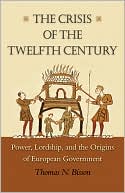

 |

|

The average rating for The Crisis of the Twelfth Century: Power, Lordship, and the Origins of European Government based on 2 reviews is 3 stars.
Review # 1 was written on 2010-11-13 00:00:00 Daniel Garza Daniel GarzaThis was a frustrating book to read because I spent most of the time trying to figure out what the author meant. The start of the book is particularly rough because the author does not explain why he wrote the book, what his thesis is, or what kind of evidence he will be examining. Also, and this in particularly annoying in this level of research, he writes in sentence fragments. He also starts sentences and paragraphs with `But', as well as other such errors. It's very annoying and makes it difficult to understand. If this was a best seller or genre book it would be tolerable, but his audience is mostly college educators and students. There are some interesting ideas in the book. If I have it right this is Bisson's thesis. 1) There was an increase in violence related to `lordship'* starting in the mid-eleventh century. This was due to an increase in population overall, but especially of `lords'. These extra high status individuals (younger sons mostly) in order to maintain their status needed to establish their own, new territory. In essence, a new layer of lords was created between the king, prince or duke and the peasants. 2) This led to a moral and cultural `crisis' manifested by complaints from the peasantry and reactions from the overlords. The modern approach is to see these changes as political in both the governing and faction sense. Bisson's thesis is that these events can be viewed from the moral and cultural angle as well, and that this is how the people alive then saw these events. Bisson examines the Investiture Conflict, the Norman Conquest of England and various papal, HRE and Spanish events from this light. I'm not sure I completely agree with the first part. To me it seems that the violence stopped being from outsiders (Vikings and Arabs) and became internally generated. This meant that it was able to be dealt with internally, by rulers controlling lesser lords. I agree about the excess gentry, these were the source of many of the fighters in the Crusades, the Norman invasion, the reconquest of Spain, etc. I also like the idea of looking at events from a different angle, it helps explain things that don't make sense otherwise. Human events are rarely pure, politics, economics, culture, and a host of other factors influence the outcome. If you already know about the Investiture Conflict, the Norman Conquest, the various troubles of the HRE in controlling their underlings and a bit of papal history you are ready for this book and will find the ideas intriguing. I am mostly familiar with British, Papal and Mediterranean history, so some details were new to me. * 'Lordship' seems to be the preferred term for what used to be called feudalism. The definition of feudalism has become so thorny most serious scholars won't use it today. |
Review # 2 was written on 2017-01-17 00:00:00 Neil Baker Neil BakerThere's a lot of info in here, but I had a hard time getting much out of it. This book has the tricky combination of being tough to read and difficult to skim. Bisson notes that the traditional view of the 12th century is of anything pub crisis in political power. It's a key era in the rise of the nation-state, as rulers like England's Henry II and France's Philip Augustus made strides centralizing power in their realms. But Bisson notes that this is backwards reading. Looking on it's own terms, this was an era of political upheveavl and discord. At one point, Bisson hammers that point home by providing a (lengthy) list of places experiencing political strife over power. Seemingly every year something blew up in some corner of western Christendom. Bisson's main point is that the era began with one main ideology of power: Lordship. This is when a local power had personal control over a realm and its inhabitants. Rather than primarily focus on the structure of it or the top dynasties, Bisson notes that the power of the lordship stemmed from the power of the sword. If you could enforce your will upon a people, you could be a lord. But the key was you had to enforce. So it was based upon exploitation. And it wasn't always very stable. Sure, some where born to it, but others tried to establish a lordship for themselves. The early 12th century witnessed an explosion of lords, as they gained more and more power over local areas. The rise of kings later on went directly into this - but wasn't as well addressed an ideology at first. I started skimming more and more as the book went on, so I'm still a bit hazy on how the crisis was resolved - but I know the king's power grew. Bisson notes that we treat that as inevitable, but it wasn't, as some places like Catalonia didn't have this power centralization occur. There were financial elements of the new power structure. Our sources nowdays take things from the point of view of the nation, but that leads historians astray as from the era itself power was justified from the lords, not the nations. |
CAN'T FIND WHAT YOU'RE LOOKING FOR? CLICK HERE!!!